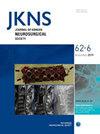硬膜外前夹层切除术对下卧位后交通动脉瘤的实用性 :尸体研究
IF 1.4
4区 医学
Q4 CLINICAL NEUROLOGY
引用次数: 0
摘要
目的:探讨硬膜外前斜突切除术在尸体解剖夹闭下骑后交通动脉(PCoA)动脉瘤中的应用价值。方法:对12例成人尸体头部(共24侧)进行解剖测量,比较手术前和手术后颈动脉和颈动脉(ICA)的显微手术暴露情况。所有尸体均行标准翼点开颅术和横贯入路。测量ICA分岔到PCoA原点的距离(D1)、ICA分岔前斜切到幕的距离(D2)、ICA分岔后斜切到幕的距离(D3)、ICA分岔前斜切到幕到PCoA原点的距离(D4)、ICA分岔后斜切到幕到PCoA原点的距离(D5)、ICA前斜切到幕到PCoA原点的距离(D6)。我们用数字精密尺测量了Yasargil夹刀片的精确厚度,以确认硬膜外前斜突切除术的有效性。结果:12具尸体共解剖24个部位。尸体年龄79.83±6.25岁。雄性和雌性的数量相同。PCoA近端起点至斜前幕(D4)间距为1.45±1.08 mm(最大4.01,最小0.56)。斜突切除后,从PCoA近端起点到斜突后幕(D5)的间距为3.612±1.15 mm(最大6.14,最小1.83)。硬膜外斜突切除术后暴露的近端ICA长度(D6)为外侧2.17±1.04 mm和2.16±0.89 mm本文章由计算机程序翻译,如有差异,请以英文原文为准。
The Usefulness of Extradural Anterior Clinoidectomy for Lower-Lying Posterior Communicating Artery Aneurysms : A Cadaveric Study
Objective : To confirm the usefulness of the extradural anterior clinoidectomy during the clipping of a lower riding posterior communicating artery (PCoA) aneurysm through cadaver dissection. Methods : Anatomic measurements of 12 adult cadaveric heads (24 sides total) were performed to compare the microsurgical exposure of the PCoA and internal carotid artery (ICA) before and after clinoidectomy. A standard pterional craniotomy and transsylvian approach were performed in all cadavers. The distance from the ICA bifurcation to the origin of PCoA (D1), pre-anterior clinoidectomy distance from the ICA bifurcation to tentorium (D2), post-anterior clinoidectomy distance from the ICA bifurcation to tentorium (D3), pre-anterior clinoidectomy distance from the tentorium to the origin of PCoA (D4) and post-anterior clinoidectomy distance from the tentorium to the origin of PCoA (D5) and the distance of the ICA obtained after anterior clinoidectomy (D6) were measured. We measured the precise thickness of the blade for the Yasargil clip with a digital precision ruler to confirm the usefulness of the extradural anterior clinoidectomy. Results : Twenty-four sites were dissected from 12 cadavers. The age of the cadavers was 79.83±6.25 years. The number of males was the same as the females. The space from the proximal origin of the PCoA to the preclinoid-tentorium (D4) was 1.45±1.08 mm (max: 4.01, min: 0.56). After the clinoidectomy, the space from the proximal origin of the PCoA to the postclinoid-tentorium (D5) was 3.612±1.15 mm (max: 6.14, min: 1.83). The length (D6) of the exposed proximal ICA after the extradural clinoididectomy was 2.17±1.04 mm on the lateral side and 2.16±0.89
求助全文
通过发布文献求助,成功后即可免费获取论文全文。
去求助
来源期刊
CiteScore
2.90
自引率
6.20%
发文量
109
审稿时长
3-8 weeks
期刊介绍:
The Journal of Korean Neurosurgical Society (J Korean Neurosurg Soc) is the official journal of the Korean Neurosurgical Society, and published bimonthly (1st day of January, March, May, July, September, and November). It launched in October 31, 1972 with Volume 1 and Number 1. J Korean Neurosurg Soc aims to allow neurosurgeons from around the world to enrich their knowledge of patient management, education, and clinical or experimental research, and hence their professionalism. This journal publishes Laboratory Investigations, Clinical Articles, Review Articles, Case Reports, Technical Notes, and Letters to the Editor. Our field of interest involves clinical neurosurgery (cerebrovascular disease, neuro-oncology, skull base neurosurgery, spine, pediatric neurosurgery, functional neurosurgery, epilepsy, neuro-trauma, and peripheral nerve disease) and laboratory work in neuroscience.

 求助内容:
求助内容: 应助结果提醒方式:
应助结果提醒方式:


